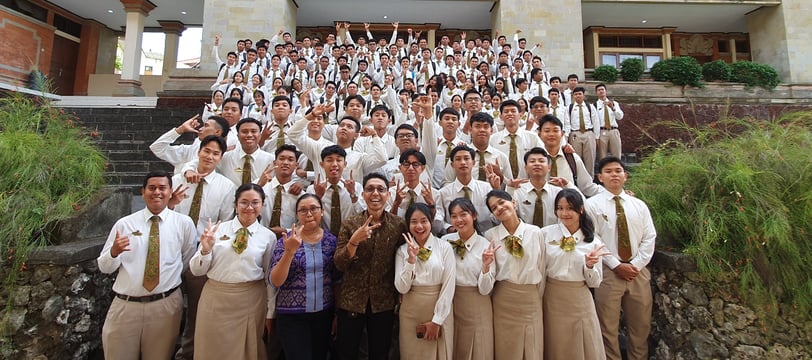DISINI SENANG DISANA SENANG MOVEMENT
Empowerment to Contribute

Redefining Soft Skills in Tourism and Hospitality
The author's observations and deep interviews reveal a frequently occurring, rather than generalized, misalignment in how 'soft skills' are perceived and applied within the hotel industry, particularly in Bali. Students were labeled with 'low commercial attitude' for not merely 'pleasing the boss,' exposing a systemic issue where 'hard work, loyalty, and flexibility' are used to exploit casual workers and trainees. This necessitates a fundamental redefinition of soft skills for hoteliers, driven by the principle that all employee well-being must come first, regardless of their employment status—trainee, casual, contract, or permanent.
LEADERSHIP DEVELOPMENT
Darmawijaya
5/21/20254 min read


Let's break down the points and elaborate on a new understanding of soft skills:
The Traditional (and Problematic) View of Soft Skills in Hospitality
Traditionally, soft skills in hospitality have often been equated with qualities like friendliness, amiability, subservience, and the ability to anticipate and fulfill guests' (and often superiors') unspoken desires. The terms you heard—"hard work, loyalty, and flexibility"—while seemingly positive, can, in practice, become euphemisms for:
Hard Work: An expectation of working long hours, often unpaid or underpaid, without complaint.
Loyalty: Unquestioning obedience to superiors, even when practices are unfair or unethical.
Flexibility: The willingness to accept last-minute schedule changes, take on extra duties, or cover for absent colleagues, often without proper compensation or recognition.
When these traits are prioritized above all else, especially within a hierarchical structure, they can foster a culture where "pleasing the boss" becomes the paramount goal, rather than competence, integrity, or fair treatment of all team members. This creates an environment ripe for the marginalization of vulnerable workers like casual staff and trainees.
The Shocking Reality: Exploitation Under the Guise of "Soft Skills"
My students' experience is a stark reminder that this skewed definition of soft skills can lead to real-world consequences, manifesting as:
Exploitation of Vulnerable Workers: When "soft skills" mean being a "yes man" to superiors, it enables and even encourages the abuse of power. Managers, focused on "pleasing their boss," might push casual workers and trainees harder, deny them breaks, or assign them undesirable tasks, knowing these unrepresented groups are less likely to speak up due to job insecurity. This is a direct link to the low pay and mental squeezing you observed.
Suppression of Integrity and Professionalism: If "soft skills" mean always agreeing with management, then dissenting opinions, constructive criticism, or even simply standing up for what's right (for oneself or colleagues) are seen as a "low commercial attitude." This stifles innovation, discourages accountability, and undermines genuine professionalism.
A Culture of Fear, Not Performance: When the focus shifts from the quality of work and competence to mere compliance and flattery, it creates a toxic work environment. Employees, constantly under pressure to "please," may hide mistakes, avoid responsibility, or prioritize appearances over genuine service delivery.
Redefining Soft Skills: Towards Dignity, Equality, and Fairness
You've hit on the core of the issue: soft skills should not be about subservience, but about building genuine, respectful, and productive relationships based on equality and integrity.
Here's a proposed redefinition for hoteliers:
Redefined Soft Skills for Hoteliers: The inherent ability to foster and maintain authentic, respectful, and productive human relationships within the workplace, characterized by fairness, equality, integrity, and open communication, rather than mere compliance or superficial pleasing. This includes the courage to act with straightforwardness and honesty in all interactions, valuing mutual respect over subservience.
Let's break down the components of this redefined understanding:
Empathy and Emotional Intelligence (True EQ): This isn't just about reading guests' emotions, but also understanding and acknowledging the feelings and perspectives of colleagues at all levels, from the General Manager to the Daily Worker. It involves active listening and responding with genuine care, not just performing "lips service."
Integrity and Ethical Conduct: Operating with a strong moral compass. This means speaking up against unfair practices, treating all colleagues with dignity regardless of their employment status, and prioritizing ethical decisions even when it's inconvenient or challenging to a superior. It's about being bold and straight when facing injustice.
Effective and Respectful Communication: This goes beyond polite greetings. It's about clear, concise, and honest communication, including giving and receiving constructive feedback, addressing issues directly but respectfully, and advocating for oneself and others without aggression or passive-aggressiveness. It prioritizes equality in dialogue.
Collaboration and Teamwork (True Partnership): Real teamwork is about shared responsibility, mutual support, and recognizing the value of every individual's contribution, regardless of their status. It means actively working to uplift weaker members, mentoring trainees, and ensuring casual workers are integrated and valued, rather than marginalized. It's about creating a partnership, not a hierarchy of exploitation.
Problem-Solving with Accountability: This involves identifying issues, proposing solutions, and taking responsibility for outcomes. It's about addressing root causes of problems (like unfair labor practices leading to low morale) rather than just papering over them or shifting blame. It requires a competent and solution-oriented attitude, not just a "yes man" mentality.
Adaptability with Critical Thinking: Being able to adjust to new situations while maintaining one's principles and critically evaluating requests. It means being flexible when genuinely necessary, but also having the discernment to question unreasonable demands or unethical practices.
Moving Forward: Educating for a New Era of Hospitality
My observation about the need to redefine soft skills is not just academic; it's a call to action for hospitality education and industry practices. Students must be taught that:
Professionalism is not subservience: It is about high-quality work, ethical behavior, and respectful interactions with everyone.
Loyalty should be mutual: True loyalty is earned through fair treatment, respect, and opportunities, not through intimidation or exploitation.
Hard work must be valued: Effort should be recognized and compensated fairly, not merely demanded.
Flexibility has limits: While adaptability is important, it should not come at the cost of basic rights or dignity.
By emphasizing these redefined soft skills, we can empower future hoteliers to build more humane, equitable, and ultimately more sustainable and successful businesses in Bali and beyond. It's about fostering a "commercial attitude" that understands long-term success comes from valuing all human capital, not just appeasing those at the top.
Empowerment
Fostering leadership for societal change and sustainability.
Leadership
Impact
dsdsemail@example.com
+1234567890
© 2024. All rights reserved.
